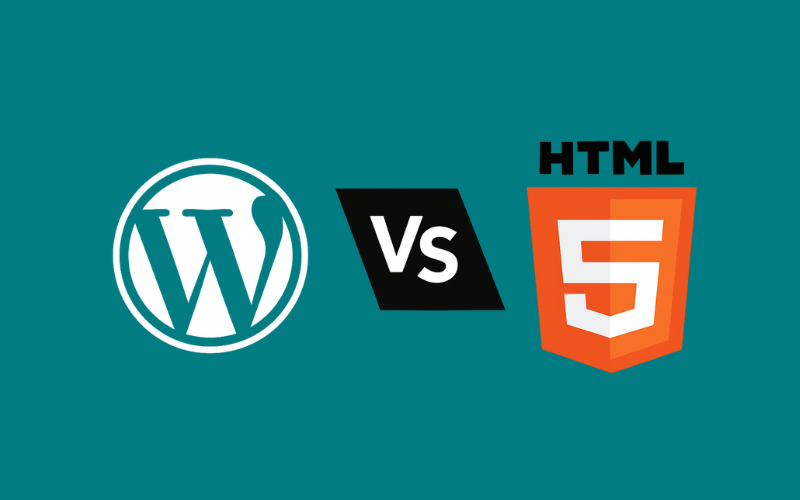When building a website, one of the biggest questions is: WordPress or pure HTML? Both are popular, but they serve different purposes. Let’s compare them step by step so you can decide what works best for your business or personal project.
What is WordPress?
WordPress is a content management system (CMS) that lets you build, customize, and manage a website without needing advanced coding knowledge. It’s user-friendly, offers countless themes and plugins, and is designed for flexibility. From personal blogs to e-commerce stores, WordPress powers over 40% of all websites online today.
What is HTML?
HTML (Hypertext Markup Language) is the basic coding language of the web. When you build a site in HTML (with CSS and JavaScript), you’re literally writing each line of code. This gives developers full control, but it requires technical knowledge, time, and constant attention to detail.
Pros & Cons of WordPress
✅ Pros of WordPress
- Beginner-Friendly
WordPress is easy to learn and manage. Even without technical skills, you can publish content, update pages, and install features using plugins. This makes it a great choice for entrepreneurs, small business owners, and anyone who wants control over their website without hiring a developer. - Thousands of Themes & Plugins
WordPress offers a vast library of free and premium themes plus over 60,000 plugins. These allow you to add almost any feature—like SEO tools, e-commerce, or booking systems—without touching code. It saves time and gives your site a professional look with minimal effort. - SEO-Friendly
WordPress is designed with SEO in mind. Plugins like Yoast or Rank Math help optimize content, meta tags, and structure, giving websites a strong foundation for better search engine rankings. This makes it easier for businesses to attract organic traffic and grow online visibility. - Quick Setup & Easy Updates
Launching a WordPress site takes only a few hours. You can set up, customize, and publish quickly compared to coding in HTML, which takes weeks or months. Plus, updates are straightforward—just a few clicks to stay current with security and features.
❌ Cons of WordPress
- Can Become Slow
Using too many plugins or heavy themes can slow down a WordPress site. While performance can be improved with optimization tools, users need to be mindful about what they install to maintain speed and keep visitors from leaving. - Regular Maintenance Needed
WordPress requires frequent updates to its core software, themes, and plugins. Failing to update can leave your site vulnerable to security risks. While updates are simple, they still demand ongoing attention to ensure smooth performance. - Limited Flexibility vs. Custom Code
WordPress is flexible, but it can’t always match the precision of custom-coded HTML. For highly specialized or advanced projects, developers may find WordPress limiting and prefer building from scratch with HTML, CSS, and JavaScript.
Pros & Cons of HTML
✅ Pros of HTML
- Complete Control
Coding with HTML gives developers full freedom to design every detail exactly as they want. There are no preset templates or plugin limitations. This makes it ideal for projects that require custom functionality and unique design. - Faster Performance
A well-coded HTML site is lightweight and loads quickly since it doesn’t rely on plugins or a CMS. This can improve user experience and SEO rankings, especially if the site is small and doesn’t require frequent updates. - No Plugin Dependency
With HTML, you’re not tied to third-party plugins or software updates. The site remains stable until you choose to make changes. This reduces compatibility issues but requires technical skill to maintain.
❌ Cons of HTML
- Requires Coding Knowledge
Building with HTML means knowing HTML, CSS, and often JavaScript. Non-technical users will struggle to make even simple changes, often needing to hire a developer for ongoing updates, which increases costs. - Time-Consuming to Build
Unlike WordPress, which can be launched in a day, an HTML site can take weeks or months to build. Even small adjustments, like changing a headline or adding a page, must be coded manually, which is slow. - Difficult to Scale
As your business grows, adding new features to an HTML site can be challenging. What starts as a simple site may require extensive recoding or even a full rebuild to accommodate growth, making it less future-proof. - Manual SEO Work
Unlike WordPress, where SEO tools guide you, HTML sites require manual optimization. Every meta tag, schema markup, and sitemap must be coded, which takes expertise and extra time.
Why WordPress is Better for Most People
For businesses and individuals who want a website that is professional, easy to manage, and scalable, WordPress is the clear choice. It saves time, reduces costs, and allows you to focus on growth rather than coding. HTML works for custom, developer-heavy projects—but WordPress wins for accessibility and flexibility.
Final Word
If you love coding and want full control, HTML might be for you. But if you want to launch quickly, manage easily, and grow confidently, WordPress is better than HTML for most people.
👉 Ready to take the next step? Contact us today and let’s start building your success story.









